Don't wanna be here? Send us removal request.
Text
I would also add that I think everyone is characterizing this 'rules lawyer'-GM relationship as necessarily antagonistic, when I feel if both parties are reasonable it can be actually very fruitful.
As a GM playing a system for the first time I like to have someone who knows the rules much better than I do around. It helps share the load of rules refereeing and makes you feel as though you have someone who can help out when you need them. I had one player in a game that was so indispensable that I asked them for help designing the final boss of the campaign.
I think trust is an important element to this equation. You need players you can trust to not try and stack the deck in their favor at everyone else's expense. You need a GM you can trust is genuinely on your side and wants to tell a cool story with you.
I briefly mentioned this in one of my last posts but I really dislike the way "the rules lawyer" is vilified in lots of RPG related memes and stories. Like oh no, this person actually knows the rules of the game, what a horrible person.
Okay I know it's deeper than that: usually those stories revolve around the idea that the GM made a ruling that actually contradicts the rules as written and The Rules Lawyer called it out and then got punished for it because actually the first rule is that the rules are the purview of the GM and you can't actually count on the rules as written in the game that the group is actually playing because at any time the GM can decide to deviate from those rules and like... I'm going to side with the person who assumed they were playing Dungeons & Dragons and not a version of the game that only exists in the GM's mind.
I mean sure house rules and homebrew are a thing but I'm of the opinion that those things also rely on the group being informed about them so they can also make informed rules decisions.
815 notes
·
View notes
Text
I agree with this, though I think tone and character are also considerations. I think it's entirely fair to ignore the macro societal reasons for why a bandit group or person may bandit and look at more of the micro character reasons.
I think it's all well and good to consider what social factors may have led someone to become a bandit, but it's not a one size fits all way to solve the problem of boring and dehumanized bandits. I think more often it's going to be more useful to consider the bandits as distinct characters and their role in the emerging narrative of the game. Are they comedic relief? Are they hardened villains? Are they sympathetic people you have to navigate one way or another? I think these are also important questions.
I do really agree that bandits make bad mooks. There are of course the optics of having your heroes wade through a bunch of what are often peasants in a bad situation to consider, but also they're fundamentally not very interesting as foot soldiers or a random ambush. When you have colorful minions like zombies or demons it feels a bit of a cop out to have a bunch of goons with swords pop out of bushes.
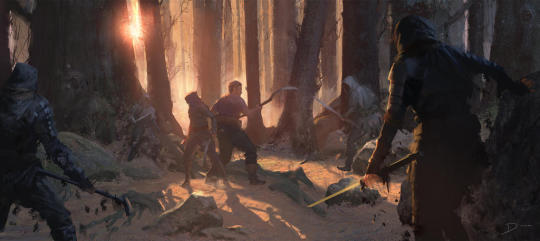
Monsters Reimagined: Bandits
As a game of heroic fantasy that centers so primarily on combat, D&D is more often than not a game about righteous violence, which is why I spend so much time thinking about the targets of that violence. Every piece of media made by humans is a thing created from conscious or unconscious design, it’s saying something whether or not its creators intended it to do so.
Tolkien made his characters peaceloving and pastoral, and coded his embodiment of evil as powerhungry, warlike, and industrial. When d&d directly cribbed from Tolkien’s work it purposely changed those enemies to be primitive tribespeople who were resentful of the riches the “civilized” races possessed. Was this intentional? None can say, but as a text d&d says something decidedly different than Tolkien.
That’s why today I want to talk about bandits, the historical concept of being an “outlaw”, and how media uses crime to “un-person” certain classes of people in order to give heroes a target to beat up.
Tldr: despite presenting bandits as a generic threat, most d&d scenarios never go into detail about what causes bandits to exist, merely presuming the existence of outlaws up to no good that the heroes should feel no qualms about slaughtering. If your story is going to stand up to the scrutiny of your players however, you need to be aware of WHY these individuals have been driven to banditry, rather than defaulting to “they broke the law so they deserve what’s coming to them.”
Keep reading
1K notes
·
View notes
Text
Storytime: Fallout 4: Arlen Glass
"We made toys. We made children happy. That's all that mattered."
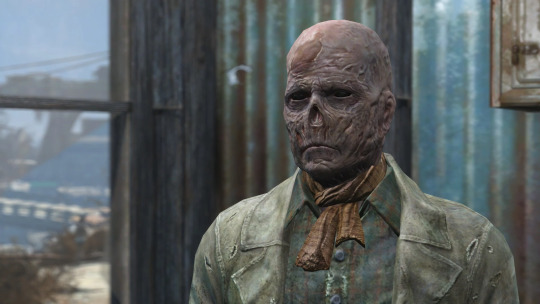
(For Setting Specific Terms, which you will find bolded, look at the glossary below)
In a refuge for ghouls tossed out of Diamond City, there is a ghoul named Arlen Glass. This man was the co-founder of Wilson Atomatoys, a toy company that turned to make material for war during a year of lost profits. Arlen strongly disagreed with this choice and was tossed out of the company.
Arlen would try to convince the new head of the company, Marc Wilson, to back out of the military contract. When this didn't work, he drove home, only just in time to find his home and family a smoking crater when Nuclear War had begun. Arlen lay in the crater and this is what led him to transform into an immortal ghoul.
We meet him nearly two hundred years later in the Slog when he gives the player a minor quest to recover some spare parts. But the players can also bring him a holotape made by his dead daughter Marlene. Once we do this, he will finally finish the toy he has been working on and will start wandering the wasteland, apparently having made peace with his past.
Analysis:
I was worried there wouldn't be much to analyze when I first chose Arlen's questline and interactions, but there are actually a few themes that this story plucks at beyond the pathos of the story itself.
Fallout is a series that is critical of US capitalism and commercialization, often with a glib sense of humor but also sometimes with seriousness. The former can be seen in Nuka Cola, which had such a disregard for the health of their customers they made a drink that was literally radioactive. Atomatoys is an example of the latter.
There are few ways to make an anti-corporate message blunter than a literal toy company enrolled in a secretive defense contract, that led to the firing of one of its founders because he didn't want to make weapons. However, it becomes somewhat sadder if you look at Arlen Glass specifically.
In your conversations with him in the game, you get the sense the man's primary motivation is making children happy with cool toys. The man is making toys even after a nuclear apocalypse, which shows his dedication to it has little to do with money. There's something sad about the fact that he was thrown out of the company unceremoniously for objecting to a military contract.
But I think the other theme this story touches on is perhaps more interesting: regeneration. Arlen is still going. He's still making toys even after the apocalypse. In fact, he ends up leaving a Giddyup Buttercup toy to you, with a note saying "For a child who needs it."
The Fallout series is about devastation and collapse, but it's also about the reliance on humankind. Compared to other apocalypses, it's quite crowded. Fallout has been a game with hundreds of NPCs you can talk to and get to know, and I've always found that comforting.
My thoughts:
Fallout 4 is not the best fallout game, not even the best I've played, in terms of story. There's a lot about it that feels half-baked. The dialogue is often very awkward and poorly written. The factions feel quite hollow and the overarching story feels lacking. New Vegas wasn't perfect, but it felt a lot more cohesive and well thought out than 4.
Still, this is honestly somewhat irrelevant to me when I play fallout games, and to an extent the Elder Scrolls. I play more often for the littler stories, often told mostly through environmental storytelling or things you may not have ever found otherwise. Fallout 4 does still know how to do this trick, where you come across something while wandering the wasteland that you never thought you would find.
Arlen Glass' story is not very complicated, nor particularly subtle. It is a sad man who lost everything, his work, his home and his family. Yet is speaks to me, because this is someone you can help in a way that matters, that you can feel. I wish they didn't give you any reward for giving him the tape because the act of helping someone should be enough.
The way this is done is also masterful. It's easy to miss. If you don't go down the right dialogue path or remember that this Arlen Glass is the guy from the Atomatoys offices, then you could simply end up handing in the spare parts and then going on your way, or passing by him completely. But it rewards an attentive player with a nice scene and it rewards people for considering the needs of others in a sense other than just questlines or stats.
I feel Arlen Glass is important to learn from for those interested in narrative design. Players are more likely to respond to NPCs' needs if you present the decisions not necessarily as quests or ways to move some arbitrary relationship meter, but as ways to meet their needs.
On a personal level, I nearly cried when I got to give Arlen his daughter's holotape. it's one of those moments that tugs on your heartstrings unsubtly, yet somehow artfully.
Glossary:
Ghouls: Irradiated humans who become a form of immortal mutant. Often persecuted and distrusted in the wasteland.
Diamond City: A city in what was once Boston. One of the major settlements of Fallout 4.
Nuclear War (The Great War): A global nuclear war that scoured the world in 2077.
Literally Radioactive: The Nuka Cola Quantum
---
Sorry for being late with this one! But I'm glad to get this series rolling! To make up for my lateness, I'm gonna see if I can get another one of these done in the next two to three days, then maybe a Christmas Special flavor text review? That sounds fun.
56 notes
·
View notes
Text
Storytime: A New Series
Hello! It's been a while. Sorry about that. You may not remember me if this is popping up in your feed, or this may be the first time you've seen me, but I rate flavor text on Magic the Gathering cards. Or I did until I took a somewhat impromptu hiatus.
I wanted to keep blogging, but I felt like I didn't have a way to make the content I was making different from day today. Reviews are fun, but I feel like I need a variety of potential content wells that will keep me from doing the same thing every time. I want to make this blog more regular.
I may change my name, as I am broadening my scope a bit. But I will keep reviewing magic cards. In fact, I plan on doing a proper spoiler season flavor review.
I wrestled with the problem of what I actually wanted to write about, and then it hit me: The entire reason I got into this was stories. Not the big overarching narratives, but the little things. The smaller-scale stories in bigger ones. There's something about being able to move people with recognizable characters, but there's something else about the smaller stories of people we usually never see again.
I may broaden this a tad. I have a list of prospective characters and narratives and not all of them are as small as the first one I have in mind. But I think it's best I have at least some wiggle room. With that said, I want to be talking about things that aren't talked to death, so I'm going to stray away from the main characters of a thing and the really obvious side stories. This does mean I won't be able to talk about Heart of Ice from Batman the Animated Series, but we all make grave sacrifices.
As for what I'll actually be doing, I'll be explaining the story in question. Then I'll do some analysis into what techniques are being used to convey the story in the confines of the medium. Then I'll be talking about my own personal reaction to the story. Then finally I'll have a wildcard section for any thoughts or facts I have that don't fit under the other headings.
Generally, I'll be picking mini-stories I had some sort of personal reaction to, but I am interested in getting requests. I will be very selective, just because I have to actually play, watch, read or otherwise find some way to contextualize the thing this mini story is within, but I'll try my best to use this as an opportunity to experience new media.
I'll be doing this weekly, with my flavor text rating series being biweekly. I will be a bit experimental when it comes to what days of the week those come out on specifically. Also, my spoiler reviews may be more like daily.
Also, I am aware that I don't need to formally announce a format alteration like this, given that this is the online equivalent of a journal that a few people occasionally steal from my room to read and I pretend not to notice, but this is for me as much as the people who read these. I usually need things organized into a coherent order.
Anyway, I'm really excited to get started! I'll have my first Storytime done tomorrow. If you're still confused as to what's going on, wait until then and things should be a lot clearer.*
*Note that tomorrow is a very relative term for me. It may be 3am on the 21st, but is it really the 21st if I haven't gone to bed yet?
4 notes
·
View notes
Text
Subtle Strike (Zendikar Rising)
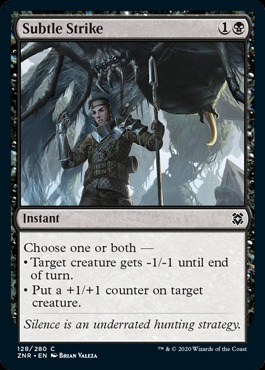
Silence is an underrated hunting strategy.
I mean the flavor text is wrong in a very literal sense. Most things that hunt do so quietly. But even if it is true I don't know what I'm supposed to take from it exactly.
The requestor for this card mentioned that this wasn't requested necessarily because they liked it and I have to agree with that sentiment.
This is not quite as oblique as Knight of the Mists flavor text, but they both prompt me to say "Okay, so what?" What does this card's opinion on hunting tactics tell me about anything? It certainly doesn't seem to have anything to do with the mechanics.
This is a classic minus for evoking confusion, and the flavor and card seem very disjointed.
Score: 3/10
-1 for evoking confusion
-1 for disjointed flavor
This card was rated by request from an anonymous source. If you wish to request a card to be rated, please send me a PM and mention whether or not you want your username to be mentioned in the rating or if you would prefer to remain anonymous.
7 notes
·
View notes
Text
Rating Flavor Text: Spoiler Season Edition (Midnight Hunt Part 1)
I'm Back! And with the advent of Midnight Hunt spoilers returning, I'll be taking a break from my shuffled scryfall shenanigans and instead reviewing notable Midnight Hunt cards spoiled on whatever day I happen do be doing this.
Personally I'm very excited and I've been wanting to do FT ratings for the new innistrad set due to how iconic the flavor from the plane can be. Few worlds in magic have such evocative mechanics and aesthetics, and the same goes for their flavor text.

"Oh, thank the angels. It's not a werewolf, just a regular wo-" - Bruno, Ulvenwald guide, last words
We start things of with a real gem. Dark Comedy always requires an artful touch. One thing that can be lost in the effort is that dark comedy is still comedy, and requires a joke. This has both setup and payoff, and it is a deliciously executed punchline.
Besides my pretentious musings on comedy, this card also gives us world information and introduces us to the tone of the world beautifully. Innistrad is a place of horror and sudden death. This card reflects that nicely.
The only complaint I have is the little "last words" bit. It feels a little like gilding the lilly.
Score: 9/10
+2 for being humorous
+1 for introducing us to world details
+2 for capturing the tone and themes of the world.
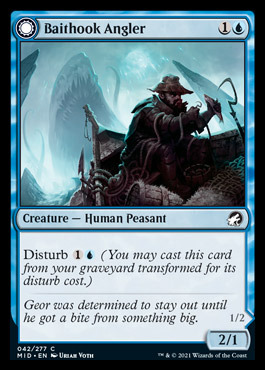

Geor was determined to stay out until he got a bite from something big
Even in death, he casts his lines, forever fishing for reasons long forgotten.
This is a case where the card art and mechanics does a lot of the heavy lifting when it comes to flavor, and then the text is a cherry on top. And honestly this isn't a bad cherry. The first line foreshadows his fate, and the second line puts emphasis on his newfound strange state.
Score: 8/10
+1 A very solid example of the tone of the world
+2 Formatted in a memorable way, like a spooky story of an angler turned to a ghost.
8 notes
·
View notes
Text
Archangel's Light

Transcription: “This is the light of Avacyn. Even in her absence she offers us hope.” —Radulf, priest of Avacyn
Commentary: Well this is the most Angel card I've ever seen.
This is perhaps the best example of 'tell don't show' harming a card's flavor text. This does tell us that Avacyn is gone, which is an important worldbuilding and plot detail for the set, but it tells us that in a fairly blunt and artless way.
The flavor of this card is used as a sledgehammer, bashing into your hand over and over that this is a super-duper angelic light from the angelic mom Avacyn. This is a real poison for Kuzco situation, where the idea that this is holy light is rephrased over and over, but with no semantic difference.
The most egregious thing is that this quote is attributed to a priest of Avacyn, when it really didn't need to. Just call this "Avacyns light," and then have the "even in her absence, she offers us hope," line as flavor text.
Score: 4/10
Score Breakdown:
- +1 for telling us that Avacyn is gone, which is useful contextual information for the set.
- -2 for being the most boring and obvious way to convey that information and flavor.
5 notes
·
View notes
Text
Blood Clock
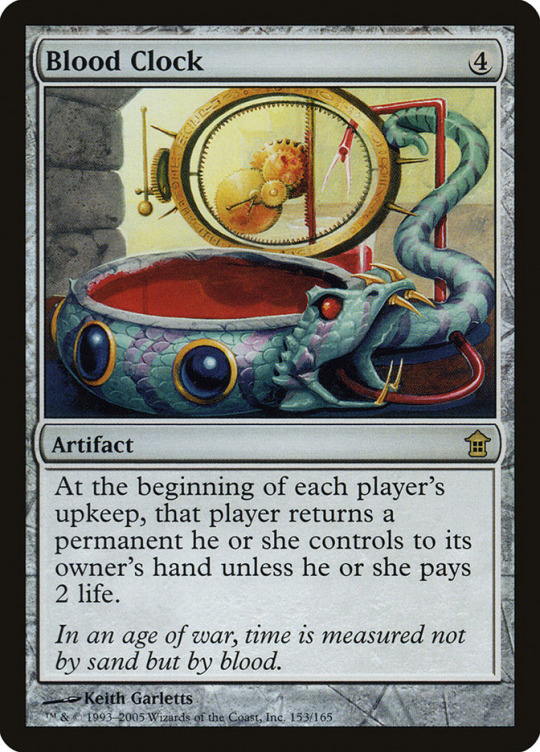
Transcription: In an age of war, time is measured not by sand but by blood.
Commentary: A delicious line which is also is flavorful for how the card is played. Blood Clock is an attrition piece, forcing your opponent to either reduce their board presence or take damage, effectively putting a clock on their actions.
This is also fitting with the story of Saviors of Kamigawa, as at this point the war with the Kami was very much a thing and according to the lore it was especially bloody.
This is a neat piece of flavor text that has a nice pithiness to it while aligning with the card and the lore.
My only complaint is that this thing is a clock, but the flavor text refers to sand. Sands are used in hourglasses, not clocks. It's one of those details that doesn't really matter but can stand out to you on occasion.
Score: 8/10
Score Breakdown:
+1 for being a memorable line
+2 for fitting both the world and the mechanics of the card very well.
This card was rated by request by Tumblr user Abelzumi. If you wish to request a card to be rated, please send me a PM and mention whether or not you want your username to be mentioned in the rating or if you would prefer to remain anonymous.
4 notes
·
View notes
Text
Child of Night (Guilds of Ravnica Printing)

Transcription: No guilds—that is her rule. The House vampires unnerve her. The Combine would dissect her, the Legion burn her, the Conclave “cure” her. The shadows are all the family she needs.
Commentary: This is a nice piece of storytelling and answers a lore question of note: Why are there guildless on Ravnica? The answer posited tells us a lot about those guildless and the guilds themselves. the quote marks around cure in relation to the Selesnya is especially telling.
But perhaps more interestingly this is a study of an individual character that also has learned that, in the harsh city of Ravnica, sometimes you can only trust yourself. Especially when you don't fit neatly into the ideologies of these guilds.
It's long, but I feel its length is justified given the lack of rules text and the fact that each part of it is put to good use in telling the story.
You sometimes forget how dark Ravnica really is, as it's not quite as much a trashfire as Innistrad or New Phyrexia but nice little tidbits like these remind us that all the guilds are assholes.
Score: 9/10
+2 for deepening the world, especially the guildless.
+2 for producing a memorable character in the form of the Child of Night herself.
This card was rated by request from an anonymous source. If you wish to request a card to be rated, please send me a PM and mention whether or not you want your username to be mentioned in the rating or if you would prefer to remain anonymous.
12 notes
·
View notes
Text
Sedge Scorpion

Transcription: Thakolides the Mighty Slayer of minotaurs Vanquisher of giants Killed by a scorpion —Inscription on an Akroan grave
Commentary: A very admirable use of space. Normally vanilla creatures have a tendency to look somewhat plain and boring. Having a nice flavor text can really spice up an otherwise rote design.
And this is a fairly juicy morsel. A lot of greek myths are about the laying low of those with hubris, so the idea of a mighty hero being slain by a lowly scorpion is pretty fitting.
This also is a very neat example of flavor text enhancing a card by telling players how to play with it. A lowly scorpion can destroy a great hero if you block with it or if that hero blocks your scorpion. It doesn't matter how many giants your hero can kill, he's still going to die if he takes damage from this little 1/1.
The way it's written too is very nice. It has an almost poem-like structure and it feels appropriately mythical in form for a Theros card. Flavor text that has a narrative within is generally very nice to see.
I have very few nitpicks, but one of them would be this doesn't tell us anything about this particular scorpion and could have been given to anything else that's marginally venomous. In fact, I argue scorpions are fearsome, so while the flavor text still works as a lesson in hubris laid low by the humble, it feels like a missed opportunity. Something smaller and more seemingly pathetic might have been a better animal.
Still, I don't think that alters the overall score much. This is a rather nice little gem that helps to brighten this card.
Score: 8/10
Score Breakdown:
+1 for being flavorful in the context of mythic Theros.
+1 for being formatted and written memorably
+1 for adding depth to the cards abilities, teaching new players how they work.
This card was rated by request from an anonymous source. If you wish to request a card to be rated, please send me a PM and mention whether or not you want your username to be mentioned in the rating or if you would prefer to remain anonymous.
13 notes
·
View notes
Text
Knight of the Mists

Transcription: Fear the mists, for they are armed.
Commentary: There are a million questions this piece of flavor text raises, but not in a good way. A lot of them are variations on “What are you talking about?” and “What were you thinking?”
This one may take a while to explain how I feel, so I’m going to go through my thought process systematically.
What does this tell me about Knight of the Mists? Absolutely nothing I can parse. I can maybe discern that the mists somehow command the knight. But did they create that knight or is it just loyal to the mists? Is it made of mists or a spirit of the mists? Some sort of illusion? Are these specific mists that I should fear because they make knights, or all mists? I shouldn’t have to work this hard to bash out any sort of tangible meaning as to what is going on in a card.
Does this evoke the correct flavor for a mist related knight? I can’t rightly say because the card itself seems to be a disjointed, shambled construct of random mechanics stapled together with basically only the wisps of cohesive thought. There is at most the clinically dissected ghost of flavor here.
Does this deepen the card? I’d argue it makes the card more shallow. It’s a snappy line, but it feels as if it’s incongruous with the card itself. I have many questions, but they come from frustrated confusion rather than a piqued curiosity.
I will admit this text did have an uphill battle. If someone passed this card to me and asked me to make flavor text for it, I would have a hard time. However, I think this is a missed opportunity to define a fundamentally formless, directionless card.
I think flavor text can sometimes save a bad card, making it more iconic and helping it resonate with a player. This flavor text feels like someone was given this card and had to think of something pithy to say about it, meaning and sense be damned. It’s a decently cool line, and unfortunately that’s all it is.
Also, I know I did imply I wouldn’t be dissecting these cards as magic cards. But I think I’m going to have to make an editorial section because I have many words to say about this baffling piece of cardboard.
Score: 1/10
Score Breakdown:
-2 for obfuscating the card when it should have helped lend clarity to a confusing design.
-1 for making the card more shallow
-1 for evoking confusion
4 notes
·
View notes
Text
Llanowar Elves (Fifth Edition)
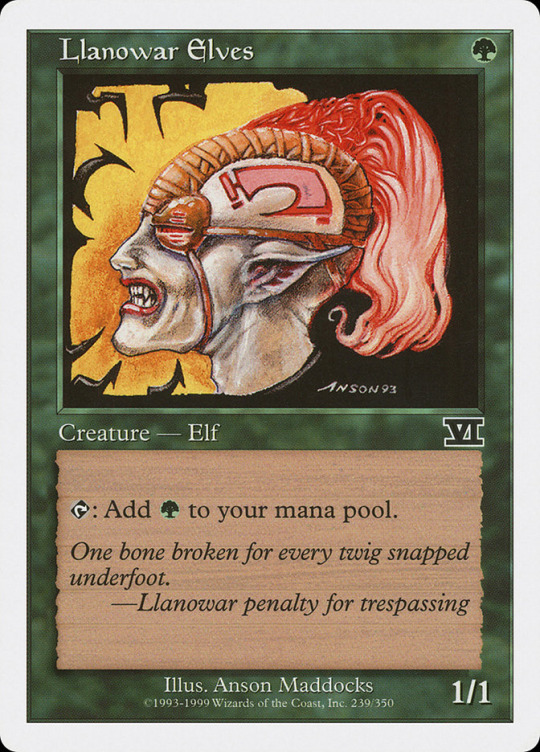
Transcription: One bone broken for every twig snapped underfoot. —Llanowar penalty for trespassing
Commentary: A classic. This is a well known flavor text and for good reason. It takes masterful advantage of the format it’s written in, having a setup in the quote itself before having a reveal that deepens the quote in the next line. It tells us about the Llanowar and is nicely written.
However, I would say that as good as this flavor text is, it’s not very good on this card. We have a Brawn problem where a very tiny creature is trying to tell you it’s very tough. Llanowar elves is the sort of person who watches a horror movie and says “I’d totally kick Jason’s ass,” only to get their own butt kicked by Brass Squire or a Pig token.
I know Llanowar Elves is a strong card, but having it bear the “We’ll break your bones for clumsy walking” flavor text seems disingenuous when it’s actually going to tap for some mana so someone else can smash your knees.
Score: 8/10
Score Breakdown:
+3 for being a really good memorable line
+1 for informing us about the Llanowar
-1 for being incongruous with the card’s mechanics
6 notes
·
View notes
Text
Midnight Reaper
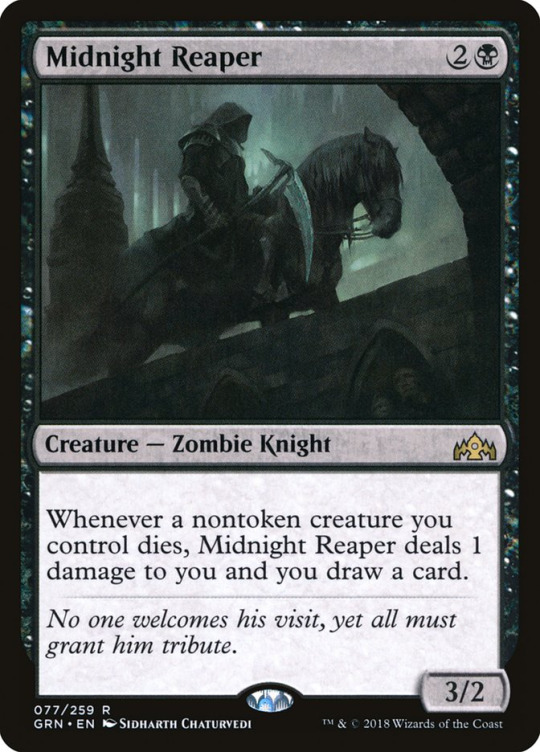
Transcription: No one welcomes his visit, yet all must grant him tribute.
Commentary: This flavor text just sounds good. It’s very much form over function. If it tells us anything about midnight reapers, then it’s in a very oblique way that doesn’t convey information so much as tone.
The flavor text compliments this card in a very raw, emotional way that I think is really neat. It gives us just a bit of spice, a little bit of character, that really helps us imagine this creature as a real being riding down the streets of Ravnica.
Score: 8/10
+3 for enhancing the atmosphere and tone of the set and card.
5 notes
·
View notes
Text
Caught in the Brights

Transcription: While hunting aether, a gremlin may ignore other stimuli, including threats to its own life.
Commentary: This is a situation where I feel like the card conveys flavor just fine, and then the flavor text actually ends up muddling things. The idea of being caught in the headlights of a vehicle is a pretty decent bit of flavor for this card already.
The information on the card is interesting. We learn that Gremlins like Aether and will sometimes search for it to the detriment of their own lives, but I don’t think that outweighs how redundant and obtrusive the flavor text feels. This is a case where the card would have been better off without the flavor text.
Score: 3/10
+1 for explaining the world
-3 for being wordy and redundant
3 notes
·
View notes
Text
Brawn

Transcription: “‘I have arrived,’ bellowed Brawn, and the plane shuddered.” —Scroll of Beginnings
Commentary: This is a quote with mighty force, delivered in a really neat package. We learn that this being was written of in religious texts and if they deliver quotes like this regularly I could see myself being converted. Not many cards have the sheer audacity to announce themselves in their flavor text, but Brawn does.
My only complaint is that this flavor text is wasted on this card. It’s a 3/3. The only thing that’s shuddering when this thing shows up on the battlefield is something with two toughness or less.
Paradoxically this very evocative and flavorful text is not that flavorful because the creature is underwhelming. This means I can’t give this card perfect marks.
Score: 9/10
Score Breakdown:
+3 for evoking awe
+2 for creating an atmosphere fitting with the card
-1 for being confusing (Why did they waste this line on a 3/3? Why Wizards, why?)
6 notes
·
View notes
Text
Regal Caracal (Secret Lair Printing)
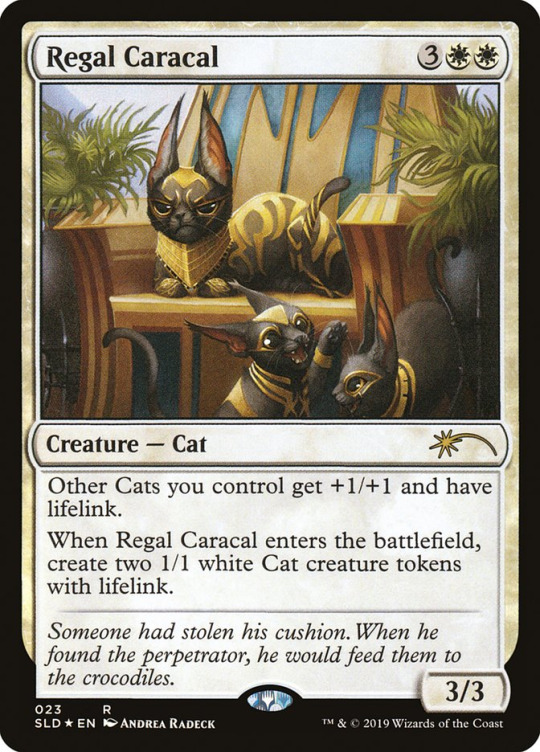
Transcription: Someone had stolen his cushion. When he found the perpetrator, he would feed them to the crocodiles.
Commentary: This card is charming and delightful. Reading the flavor text puts a small grin on my face when reading a card that’s already really packed with lots of cute imagery. There’s honestly not much to say as this is pretty solid.
I will take one point for wordiness, as I feel this could have been more efficently conveyed as a quote. There’s also a bit of oddness given that the flavor text is a little awkwardly worded as well.
Score: 7/10
Score Breakdown:
+3 for evoking humour and being charming
-1 for wordiness.
8 notes
·
View notes
Text
Giant Solifuge (Eternal Masters Printing)

Transcription: “If you’d ever met one, you wouldn’t ask me to justify the extra provisions for additional security.” —Lorref, caravan master
Commentary: This is dreadfully dull. A giant spider is, gasp, dangerous? What an earth-shattering revelation. A paradigm shift. Nothing will be ever the same again now that I know that caravans are justifiably wary of giant spiders.
This flavor text doesn’t tell us anything we didn’t know about a giant spider. It doesn’t enhance my fear I feel when someone puts it across the table from me. It also doesn’t explain why it has shroud, haste, trample or anything about the card. Worst of all, it takes four lines to text to say “big spider, very scary.”
Why is Lorref named? What insight does knowing this one caravan master give us? Is he going to pop up in Commander Legends 2?
Score: 2/10
Score Breakdown:
-1 for being wordy
-2 for being shallow, compounded by the wordiness.
4 notes
·
View notes